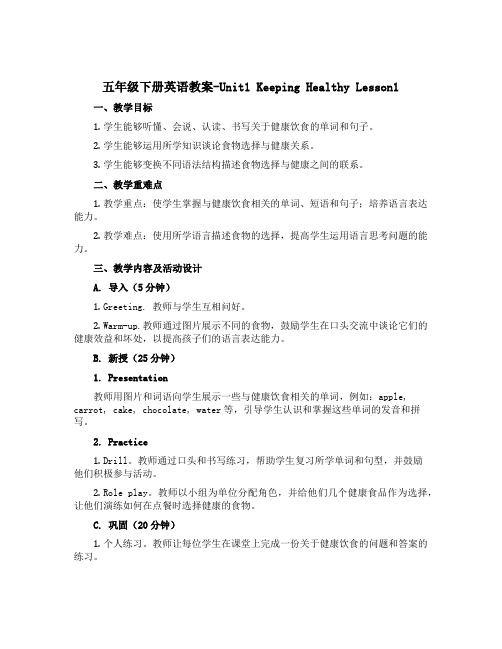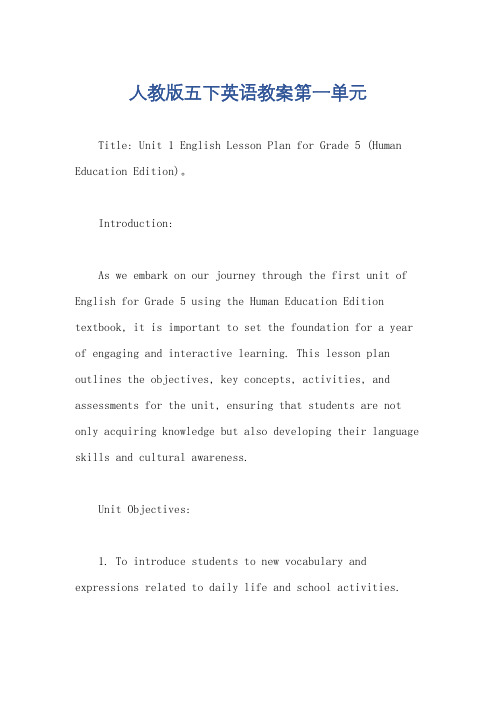新人教版五年级下册英语第一单元教案
(完整)新人教版五年级下册英语第一单元教案

()月()日总第()课时Ss: At… o’clock.(跟学生强调整点前要用介词at) 反复操练。
4. 学生听录音,分角色读Let’s learn 。
Step 3. 合作交流,师生共建(用时8分钟)新课标第一网Role- play:1) Answers the questions.T: What time is it? Ss: It’s six/nine o’clock.T: I get up at six o’clock. When do you get up/go to school?Ss: I get up at 7.a.m/ 7:30.2) Ask and write.教师引导学生完成填空,并分小组运用句型进行对话练习:T: When do you get up/do morning exercises? Ss: I get up at….a.m/p.m.老师们:在今后的每一节课都要灵活运用所学句型,请学生造句,要具有培养学生的创新意识。
Step 4. 达标检测(用时6分钟)一、看图片选短语,并译成汉语。
A. do morning exercises ()B. eat breakfast ()C. have English class ()D. play sports()E. eat dinner ()1._____2._____3._____4._____二、选词填空,并读一读。
sports, exercises , have English class , breakfast , dinner1. When do you _________________(上英语课)?2. I play _______(进行体育运动)at 6 o’clock .3. We eat ________(吃早饭)at 7 o’clock a . m .4. When do you do morning __________(早锻炼)?5. Let’s eat ______(吃晚饭)together .三、选一选,读一读。
(完整版)人教版五年级下册第一单元英语教案

(7)组织学生模仿Let’s learn进行对话。
Let’s play
(1)学生二人一组配合表演动词短语,一人表演,一人在他背后说出这个动作的名称,表演完毕后全班评选最佳拍档。
(2)学生再三人一组进行表演,第一人表演动作,第二人表演时间,第三人说出句子,如:I get up at 6:30……
3.巩固和延伸(Consolidation and extension)
(1)听Let’s talk的录音,读给家长听。
(2)帮助家长制作一张合理的时间安排表。
(3)完成作业本。
听录音
操练句型
填写调查表
课 后 记:
课 题
This is my day
课 时
第三课时
教学内容
A.Read and writeMake a surveyC.Pronunciation
T:Let’s make a timetable of his day.
c.分角色朗读对话。
d.体会文章
T:Do you like the policeman here?Why?
e.谁最可爱?
(3)Pronunciation
Pronunciation
教师向学生展示该部分的内容,然后解释这几个字母组合在单词中的发音。领读学生。
T:I like weekdays, too. Because I meet you.
2.呈现/操练(Presentation/Practice)
(1)Make a survey.
a.示范。
T:When do you get up? S:I get up at…
五年级下册英语教案-Unit1 Keeping Healthy Lesson1∣人教新起点

五年级下册英语教案-Unit1 Keeping Healthy Lesson1一、教学目标1.学生能够听懂、会说、认读、书写关于健康饮食的单词和句子。
2.学生能够运用所学知识谈论食物选择与健康关系。
3.学生能够变换不同语法结构描述食物选择与健康之间的联系。
二、教学重难点1.教学重点:使学生掌握与健康饮食相关的单词、短语和句子;培养语言表达能力。
2.教学难点:使用所学语言描述食物的选择,提高学生运用语言思考问题的能力。
三、教学内容及活动设计A. 导入(5分钟)1.Greeting. 教师与学生互相问好。
2.Warm-up.教师通过图片展示不同的食物,鼓励学生在口头交流中谈论它们的健康效益和坏处,以提高孩子们的语言表达能力。
B. 新授(25分钟)1. Presentation教师用图片和词语向学生展示一些与健康饮食相关的单词,例如:apple, carrot, cake, chocolate, water等,引导学生认识和掌握这些单词的发音和拼写。
2. Practice1.Drill。
教师通过口头和书写练习,帮助学生复习所学单词和句型,并鼓励他们积极参与活动。
2.Role play。
教师以小组为单位分配角色,并给他们几个健康食品作为选择,让他们演练如何在点餐时选择健康的食物。
C. 巩固(20分钟)1.个人练习。
教师让每位学生在课堂上完成一份关于健康饮食的问题和答案的练习。
2.小组活动。
教师分成小组,让他们一起讨论食物的选择与健康之间的关系。
让他们写下自己小组讨论的内容,并在班上分享。
D. 作业(5分钟)1.翻译。
让学生用所学语言翻译一段关于健康饮食的文章。
2.背诵。
要求学生背诵所学习的单词、短语和句子。
四、教学后记本课主要介绍了与健康饮食相关的词语和句子,并通过活动让学生练习如何根据自身需要选择健康的食品。
在课程实施中,教师应注意调动学生的积极性和参与度,并适当调整教学内容和形式,以满足不同学生的学习需求。
人教版PEP小学英语五年级下册Unit 1 教案(一)

(1)教师请同学说说他的时间表,教师板书,并与Pedro的作比较。如:
S1 Pedro
6:30 a.m. get up 7:00 a.m. do morning exercises
7:00 a.m. eat breakfast 8:00 a.m. eat breakfast
2.能利用所学句型询问和表达周末做了什么事。如:—What do you do on the weekend?—I usually/often…on the weekend.
2.学习Let’s talk。
(1)播放Let’s talk录音。边播放边请同学们思考问题:When does Pedro finish class in the morning?When does Pedro go back to school after lunch?When does Pedro usually eat dinner in Spain?
T:When do you get up? S1:I get up at…
T:When do you eat breakfast? S2:I eat breakfast at…
2.Tell your partner about your tim Nhomakorabeatable.
通过师生间相互问候融洽课堂气氛,同时交谈内容也引出了新课。
Part B
教学导航
教学内容
第一课时Let’s learn Do a survey第二课时Let’s try Let’s talk
第三课时Read and write Let’s check
教学目标
【知识目标】1.能听、说、读、写clean my room, go for a walk等单词短语,并能熟练的掌握运用。
人教版(PEP)小学英语五年级下册第一单元的教案

人教版(PEP)小学英语五年级下册第一单元的教案第一课时一.教学内容本课时教学内容是PEP小学英语五年级下册Unit 1 This is my day第一课时,通过对教材的重新整合,我所设计的教学内容为教材P2 Let’s start, Let’s chant部分;P4 Let’s learn , Let’s play部分P12:Good to know部分二、教学目标1.能够听、说、读、写以下动词短语:eat breakfast, do morning exercises, have English class, play sports, eat dinner.2.能够听懂问句:When do you do morning exercises / …? 并能用所学动词短语替换句型“I usually … at …”中的关键词回答问句。
3.能理解并说唱Let’s chant部分的歌谣。
4.能够了解Good to know 部分的内容。
5.能够利用网络搜索查找所需图片并制作发送卡片三、教学重、难点1.本课时的教学重点是掌握A部分Let’s learn中的五个动词短语,并能用这五个短语回答询问作息时间的问题。
2.本课时的教学难点是掌握五个四会短语和单词exercise, usually的正确发音。
四、教具准备1.教师准备Let’s start部分和主情景图的教学挂图。
2.教师准备录音机和录音带。
3.教师准备五年级上册第二单元的动词卡片和本单元A Let’s learn部分的动词卡片。
4.教师课前在黑板上画一个大钟,并标注时间刻度。
五、教学过程Step I Warm- up(热身)1. 师生同颂教材P2 中Let’s chant部分歌谣。
What do you do on the weekend?I usually go swimming.Sometimes I climb mountains.Sometimes I go shopping.What do you do on the weekend?I usually play the piano.Sometimes I visit grandparents,Sometimes I watch videos.(设计意图:通过琅琅上口的儿歌,帮助学生回忆所学日常生活的短语和副词Sometimes, usually的用法,为本课新授做好铺垫。
人教版小学五年级下册英语unit1教案

人教版小学五年级下册英语unit1教案教案标题:人教版小学五年级下册英语 Unit 1 教案教案目标:1. 学习并复习有关自我介绍的基本句型和表达方式。
2. 掌握使用第一人称单数和第三人称单数进行自我介绍的能力。
3. 提高学生的听说读写能力,培养学生的英语交流能力。
教学重点:1. 学习并掌握自我介绍的基本句型和表达方式。
2. 进行口语训练,提高学生的口语表达能力。
教学难点:1. 学生能够运用所学的句型和表达方式进行自我介绍。
2. 学生能够流利地进行口语交流。
教学准备:1. 课本《人教版小学英语五年级下册》Unit 1 的教材和课件。
2. 包含自我介绍的图片、卡片或者实物。
教学过程:Step 1:导入新课 (5分钟)1. 与学生打招呼,引起学生兴趣。
2. 准备一些图片、卡片或实物,用英语进行自我介绍,鼓励学生回答问题或进行简单交流。
Step 2:学习新知 (20分钟)1. 向学生展示课本 Unit 1 的相关内容,引导学生预测新课内容。
2. 播放课件或展示图片,教授有关自我介绍的基本句型和表达方式。
3. 通过示范和练习,让学生掌握并熟练运用这些句型和表达方式。
Step 3:巩固练习 (15分钟)1. 分组活动:将学生分成小组,让他们在小组内互相进行自我介绍。
2. 教师巡视各小组,给予学生指导和帮助,同时记录学生的表现和进步。
3. 鼓励学生积极参与,提高他们的口语表达能力。
Step 4:拓展延伸 (10分钟)1. 给学生一些拓展练习,如编写自己的自我介绍短文或制作自我介绍的海报。
2. 鼓励学生使用所学的句型和表达方式,进行口头或书面的自我介绍。
Step 5:课堂总结 (5分钟)1. 回顾本节课所学的内容,强调自我介绍的重要性和运用方法。
2. 鼓励学生积极参与英语学习,提高英语交流能力。
Step 6:课后作业1. 布置适当的课后作业,如写一篇关于自己的自我介绍短文或制作一份自我介绍的海报。
2. 鼓励学生在家继续练习口语表达和写作能力。
人教版五下英语教案第一单元

人教版五下英语教案第一单元Title: Unit 1 English Lesson Plan for Grade 5 (Human Education Edition)。
Introduction:As we embark on our journey through the first unit of English for Grade 5 using the Human Education Edition textbook, it is important to set the foundation for a year of engaging and interactive learning. This lesson plan outlines the objectives, key concepts, activities, and assessments for the unit, ensuring that students are not only acquiring knowledge but also developing their language skills and cultural awareness.Unit Objectives:1. To introduce students to new vocabulary and expressions related to daily life and school activities.2. To develop students' reading comprehension skills through a variety of texts.3. To enhance students' speaking and listening skills through interactive activities and role-plays.4. To foster cultural understanding and appreciation through discussions and comparisons with different cultures.5. To encourage students to use English creatively in writing tasks.Key Concepts:Vocabulary: school supplies, subjects, activities, timetables, days of the week, etc.Grammar: present simple tense, questions, commands, possessive adjectives, etc.Functional Language: greetings, introducing oneself, expressing likes and dislikes, asking for and givinginformation, etc.Lesson Plan:Week 1: Getting to Know the Unit.Activity 1: Icebreaker Start the year by getting to know each other. Students can introduce themselves in English, stating their name, age, hobbies, and favorite subjects.Activity 2: Vocabulary Introduction Present new vocabulary related to school life and daily routines using visual aids, real objects, and contextual examples.Activity 3: Reading Comprehension Introduce a story or text related to school life and discuss it with the class, focusing on comprehension questions.Week 2: Grammar Focus.Activity 1: Grammar Introduction Explain the presentsimple tense and its usage through interactive examples and practice exercises.Activity 2: Grammar Games Play games like "I Do, You Say" or "Simon Says" to practice the present simple tensein a fun and engaging way.Activity 3: Creative Writing Ask students to write a short story about their school day using the present simple tense.Week 3: Listening and Speaking Skills.Activity 1: Role-Play Set up scenarios related to school life (e.g., asking for directions, borrowing supplies) and let students role-play them, practicing their speaking and listening skills.Activity 2: Dialogue Construction Provide students with pictures or scenarios and ask them to create dialogues in English, focusing on appropriate language use and fluency.Activity 3: Listening Comprehension Play recordings of conversations or stories and ask students to answer comprehension questions.Week 4: Cultural Exploration.Activity 1: Cultural Comparison Discuss differencesand similarities between school life in different countries, focusing on cultural aspects like uniforms, holidays, and traditions.Activity 2: Interactive Map Create an interactive mapof the world where students can pin their favoritecountries and share interesting facts about their school systems.Activity 3: Creative Project Ask students to create a poster or presentation about a country's school system, incorporating both visual and textual elements in English.Assessment:Throughout the unit, formative assessments will be conducted to monitor students' progress and identify areas for improvement. These assessments may include quizzes, oral reports, and written assignments. At the end of the unit, a summative assessment will be administered to evaluate students' understanding of the key concepts and their ability to apply them in real-world scenarios.Conclusion:By following this lesson plan, students will not only acquire new vocabulary and grammar rules but also develop their language skills and cultural awareness. Through interactive activities and engaging lessons, students will be motivated to learn English and apply it in their daily lives.。
人教版(PEP)小学英语五年级下册第一单元教案

人教版(PEP)小学英语五年级下册第一单元教案1)掌握四季的单词和季节性活动的单词和短语。
2)掌握询问所喜欢的季节及其原因的句型。
3)了解字母组合air。
ear在单词中的发音以及sp。
sk的发音规律。
4)培养基本的阅读和写作技能,如快速查找关键信息和规范书写。
3.情感态度目标:1)培养学生对季节变化的兴趣和好奇心。
2)增强学生的交流能力和自信心。
3)培养学生良好的研究惯和写作惯。
4)鼓励学生积极参与课堂活动,增强研究的主动性和积极性。
Unit 2 ___Topic: Discussing favorite seasonsLanguage systems:1.Vocabulary: Master the four seasons: spring。
summer。
fall。
winter。
season。
seasonal activities words and phrases: swim。
fly kites。
skate。
make a snowman。
plant trees。
sleep.2.Grammar: ___: What’s your favorite seas on。
Which season do you like best。
Why do you like it?3.n: Learn to ___.4.Phonology: Practice ___。
ear in words and the ___ sp。
___.Language skills:1.Listening: Understand some single sentences。
dialogues。
___.2.Speaking: ___.3.Reading: Understand dialogues or short texts and develop some basic reading skills。
such as how to quickly find key n and guess words based on context.4.Writing: Write four-word words and ___.Objectives:1.Ability objectives:1) ___ and reasons。
- 1、下载文档前请自行甄别文档内容的完整性,平台不提供额外的编辑、内容补充、找答案等附加服务。
- 2、"仅部分预览"的文档,不可在线预览部分如存在完整性等问题,可反馈申请退款(可完整预览的文档不适用该条件!)。
- 3、如文档侵犯您的权益,请联系客服反馈,我们会尽快为您处理(人工客服工作时间:9:00-18:30)。
新人教版五年级下册英语第一单元教案教学内容Unit 1 My day Section A Let’s learn Ask and write P5 第( 1)课时教学目标1. 能听、说、读、写do morning exercises, eat breakfast, have…class, playsports, eat dinner。
2. 会说句型:“When do you do morning exercises/…?”并能回答“At…o’clock.”。
重点难点1. 掌握Let’s learn中的动词短语并能用于回答问询作息时间。
2. 掌握单词exercises的正确发音。
教具准备教学光盘、单词卡片。
教学过程教学过程Step1 : 预习温故(用时5分钟)1)Ss: Hello, Miss.... Nice to see you again. T: Nice to see you ,too.2)T: What time is it? (可以课前在黑板上画一个钟面,张开手臂演示一个时间)Ss:It’s 9/10/11 o’clock.(注意给学生强调整点时间后面要用o’clock)反复操练。
3)Go over these phrases : wash my clothes, watch TV, do homework, read books, play football.Let’s do homework/read books/play football/… .I often wash my clothes/watch TV/do homework/ read books/… .Step 2. 新课内容展示(用时20分钟)。
1. Use the cards to learn new phrases.T: do morning exercises, do morning exercises, follow me to read.用同样的方式教读其他词组:eat breakfast, have…class, play sports, eat dinne (重点强调exercises、breakfast的发音)。
2. T: do morning exercises, do morning exercises, Let’s/I often do morning exercises.T: eat dinner, eat dinner Let’s/ I often eat dinner.3. Read these sentences.T: I can swim/play football/play sports…..T: Can you do morning exercises/…? Ss: Yes, I can./No, I can’t.T: When do you do morning exercises /play football/play sports?”Ss: At… o’clock.(跟学生强调整点前要用介词at) 反复操练。
4. 学生听录音,分角色读Let’s learn 。
Step 3. 合作交流,师生共建(用时8分钟)Role- play:1) Answers the questions.T: What time is it? Ss: It’s six/nine o’clock.T: I get up at six o’clock. When do you get up/go to school?Ss: I get up at 7.a.m/ 7:30.2) Ask and write.教师引导学生完成填空,并分小组运用句型进行对话练习:T: When do you get up/do morning exercises? Ss: I get up at….a.m/p.m.老师们:在今后的每一节课都要灵活运用所学句型,请学生造句,要具有培养学生的创新意识。
Step 4. 达标检测(用时6分钟)一、看图片选短语,并译成汉语。
A. do morning exercises ()B. eat breakfast ()C. have English class ()D. play sports()E. eat dinner ()1._____2._____3._____4._____二、选词填空,并读一读。
sports, exercises , have English class , breakfast , dinner1. When do you _________________(上英语课)?2. I play _______(进行体育运动)at 6 o’clock .3. We eat ________(吃早饭) at 7 o’clock a . m .4. When do you do morning __________(早锻炼) ?5. Let’s eat ______(吃晚饭) together .三、选一选,读一读。
()1.你们常常三点钟上英语课吗? A. Let’s eat breakfast.()2.我通常六点钟进行体育运动。
B. When do you do morning exercises?()3.我们一起吃早饭吧。
C. Usually I play sports at 6o’clock.()4.你什么时候早锻炼? D. We eat dinner at 8 o’clock p.m. ()5.我们晚上八点吃晚饭。
E. Do you often have English classat 3 o’clock?学生小结:这节课我学到了_________________________________作业设计Step 5.布置当堂作业1.书写并背诵四会词组。
2.读背Let’s learn的对话。
板书设计板书标题 Unit 1 My day板书内容设计:do morning exercises eat breakfast have…class play sports eat dinner When do you do morning exercises/eat breakfast/…? At…o’clock. When do you get up/…? I get up at….a.m/ p.m.教学反思()月()日总第()课时教学内容Unit 1 My daySection A let's try let's talk P4第(2)课时教学目标1. 能听懂Let’s try部分的内容,并勾选出正确的图片。
2. 听、读Let’s talk部分,运用核心句子“When do you finish your class in the morning?”“We finish class at 1 o’clock.”来谈论时间,并变换单词,分角色练习对话。
重点难点1.掌握句型“When do you finish your class in the morning?”并能做出正确回答。
2.能灵活运用“When do you usually eat dinner/…”“Usually at…o’clock.”问答作息时间。
教具准备教学光盘、单词卡片。
教学过程教学过程Step1 : 预习温故(用时6分钟)1. Review “Times”(板书时间,让学生用英语说一说):10:00/6:00/9:00/…2. Review the phrases.do morning exercises —I do morning exercises at 6:00 a.m.用同样方法复习:eat breakfast、play sports、have Chinese/English class、eat dinner3. Guess the phrase(看动作):T: When do you do morning exercises/…? (板书) Ss: At … o’clock.反复操练此句型。
Step 2. 新课内容展示(用时20分钟)。
1. Let’s talk.1) 让学生勾出生词::finish class,go back to school,classes start, too late(板书并讲解其意思,并反复教读)2) 学生自读课文,理解意思,并回答提问:T: When do you finish class/… in the morning?Ss: We finish class/… at … o’clock.T: When do you go back to school/… after lunch? Ss: At … .T: When do you usually eat dinner/… in Spain? Ss: Usually at …o ’clock. 替换并反复操练几个句型,让学生掌握。
3) Listen to the tape and repeat the dialogue again. 2. let ’s try. When are Zhang Peng and Pedro? Listen and tick. Step 3. 合作交流,师生共建(用时10分钟) 活动设计1:Act “Let ’s talk ”. 分小组操练。
活动设计2: Role play .T: When do you get up? Ss: I get up at … o ’clock .T: When do you go to bed? Ss: At …in the morning. I work at night. 也可以分小组练习对话。
Teach the song “My weekend ”. Step 4. 达标检测(用时8分钟) 一、选一选,读一读。
1. —_____ do you get up?(A. When B. What ) — At 6 o ’clock .2. Classes start _____ 3 o ’clock.(A. in B. at )3. We eat dinner __________.(A. go home B. at home ) 二、选择合适的句子补全对话,并读一读。
三、为下面的句子选择正确的翻译。
Hi,Bird.1.___________2.___________I get up at 6:00 p.m 3._____When do you go to bed?4.______. A. Oh, it ’s too late. B. Hi, Owl.C. When do you get up ?D. Oh, I go to bed at 6 o ’clock a.m.()1. When do you finish class in the morning?()2. We finish class at 1 o’clock.()3. Classes start at 3 o’clock.()4. When do you usually eat dinner in Spin?学生小结:这节课我学到了______________________________作业设计Step 5.布置当堂作业1. 背诵Let’s talk。
